Planning Commissioners tour asphalt plant
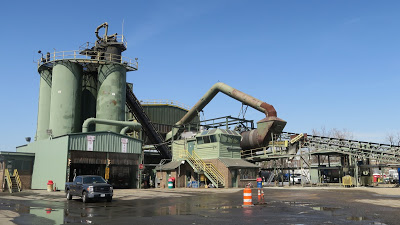 |
| Asphalt produced by Virginia Paving is stored in the silos. |
Members of the Fairfax County Planning Commission toured the
Virginia Paving Co.’s asphalt plant in Alexandria April 14 to get a feel for
how an asphalt plant in Mason District would affect nearby residents.
The Planning Commission is scheduled to vote April 19 on a zoning application from Vulcan Materials Co. that
calls for an expansion of its concrete facility in an industrial area in Mason
District near Interstate 395 along with a new asphalt plant.
calls for an expansion of its concrete facility in an industrial area in Mason
District near Interstate 395 along with a new asphalt plant.
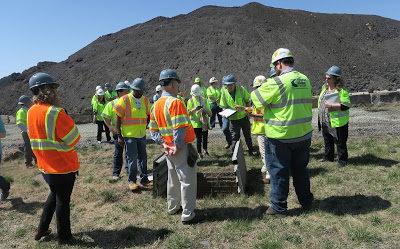 |
| Planning Commissioners and Mason District residents learn all about asphalt production. |
Residents who live near the Vulcan property are campaigning against an asphalt plant, citing odor, noise, environmental, and
health concerns. At a Planning Commission
hearing in March, several neighbors urged the commissions to reject the application.
health concerns. At a Planning Commission
hearing in March, several neighbors urged the commissions to reject the application.
Julie Strandlie, the Mason district representative on the
Planning Commission, scheduled the Virginia Paving tour so the commissioners could
see firsthand how the plant operates and how it controls odors and pollution.
Several people who live near Vulcan came along, too.
Planning Commission, scheduled the Virginia Paving tour so the commissioners could
see firsthand how the plant operates and how it controls odors and pollution.
Several people who live near Vulcan came along, too.
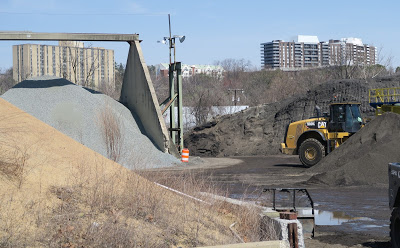 |
| Piles of sand and asphalt at Virginia Paving with apartment buildings in the background. |
There was definitely an odor of asphalt at the Virginia
Paving plant, although it bothered some people on the tour more than others. It
was also quite noisy, as there were many large trucks coming in and out during the
hourlong tour.
Paving plant, although it bothered some people on the tour more than others. It
was also quite noisy, as there were many large trucks coming in and out during the
hourlong tour.
Virginia Paving, located off S.
Van Dorn Street between S. Pickett Street and Eisenhower Avenue, produces a “warm
mix asphalt” which causes less pollution than “hot asphalt,” says Cody Sullivan, who manages Virginia Paving facilities in Occoquan and Stafford, as well as the
one in Alexandria.
Van Dorn Street between S. Pickett Street and Eisenhower Avenue, produces a “warm
mix asphalt” which causes less pollution than “hot asphalt,” says Cody Sullivan, who manages Virginia Paving facilities in Occoquan and Stafford, as well as the
one in Alexandria.

The plant isn’t operating at full capacity yet, Sullivan says. Its peak
season is mid-May to early November. It’s currently producing about 2,200 tons of
asphalt a day. During the peak period, it produces 4,000 to 6,000 tons.
season is mid-May to early November. It’s currently producing about 2,200 tons of
asphalt a day. During the peak period, it produces 4,000 to 6,000 tons.
Because there’s a limit on how long asphalt can be
transported, the Alexandria plant produces asphalt for roads and parking lots
no more than one and a-half hours away, or no farther than Arlington, Tysons,
and Woodbridge. It mostly operates at night, because that’s when most VDOT
projects are done.
transported, the Alexandria plant produces asphalt for roads and parking lots
no more than one and a-half hours away, or no farther than Arlington, Tysons,
and Woodbridge. It mostly operates at night, because that’s when most VDOT
projects are done.
 |
| A water truck sprays the ground. |
Christine Vineski, Virginia Paving’s environmental manager,
described some of the controls in place to minimize air and water pollution. There’s
a tank under the parking lot to collect and filter stormwater before it goes into
Backlick Run, and eventually into the Potomac River.
described some of the controls in place to minimize air and water pollution. There’s
a tank under the parking lot to collect and filter stormwater before it goes into
Backlick Run, and eventually into the Potomac River.
Water trucks spray the grounds periodically “to keep fugitive dust out of the air,” Vineski says. Dust is also vacuumed off the
grounds. An additive called Eco-Zorb is injected into the asphalt to reduce
odors. Emissions testing is done by a third party, and the results are
submitted to the U.S. Environmental Protection Agency and state and local
governments.
grounds. An additive called Eco-Zorb is injected into the asphalt to reduce
odors. Emissions testing is done by a third party, and the results are
submitted to the U.S. Environmental Protection Agency and state and local
governments.
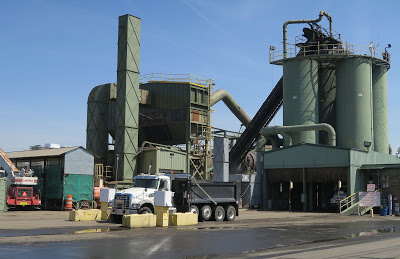
Virginia Paving is a stone’s through from the
Cameron Station community. The softball field at Samuel Tucker Elementary
School is separated from the plant by a concrete barrier and stream.
Cameron Station community. The softball field at Samuel Tucker Elementary
School is separated from the plant by a concrete barrier and stream.
Several people who live at the end of Cameron Station
closest to the plant, mostly on Brawner Place, who happened to be outdoors on
April 14 said they had no problems with odors or noise from the asphalt plant.
closest to the plant, mostly on Brawner Place, who happened to be outdoors on
April 14 said they had no problems with odors or noise from the asphalt plant.
 |
| Samuel Tucker Elementary School and Cameron Station seen from the Virginia Paving site. |
One man said he had lived there for seven years and didn’t
know the plant was there. Another resident said she didn’t notice any odors but was disturbed by noise from the train that runs close to her house.
know the plant was there. Another resident said she didn’t notice any odors but was disturbed by noise from the train that runs close to her house.
Cameron Station was built after the asphalt plant was
already there, however. If a new asphalt plant is built on the Vulcan property,
it would have an impact on already-established neighborhoods.
already there, however. If a new asphalt plant is built on the Vulcan property,
it would have an impact on already-established neighborhoods.
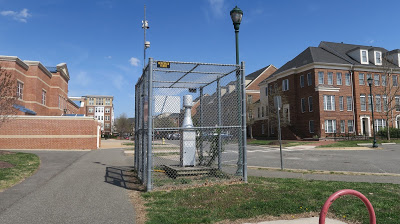 |
| An air pollution monitoring station between Samuel Tucker Elementary School on the left and Cameron Station homes. |


Thanks for this & pointing out the differences in the plant types. I spoke to people who attended reviewed contemporaneous notes. My understanding of the "location need" is that the location is more based upon keeping costs down, rather than a hard line rule of where the plant must be located. So in essence, it's appears on a very limited review (not accounting for all factors) to be less expensive to have a plant closer to other jurisdictions, say, than to locate it in Lorton, where Vulcan already has land that was obtained through a 148-acre land swamp with the County in 2015.
I was at the tour. Cody, the regional manager, said at the beginning of the tour, "I don't know if the plant is running right now." I assume a regional manager would know if the plant were running, so one can assume it wasn't. There was a lot of noise from moving around materials, but apparently they were not cooking asphalt during our visit. Note also that this plant is a different type and much smaller than what Vulcan is proposing and the Alexandria City governmment keeps them on a very tight leash.Virginia pavinng has towers which the the tour guide thought were ~60' tall; Vulcan wants a special exemption to build 135'. As far as I know, Vulcan does not even do the spraying and vacuuming to keep down dust that Virginia Paving does, and this when they are trying to get sommething from Fairfax County.
I came down with a resiratory infection with a fever two days after the tour. Not sure it's related since the timeinterval was so short, but food for thought:"Short term air pollution tied to respiratory infections' https://www.medscape.com/viewarticle/895192. Air pollution can be dangerous even if you can't smell or sense it without instruments.
Anytime I'm around paving for a few hours, I get a headache from Hades.
Is a letter to the planning commission at such a late date going to make any difference?
I hope residents of the affected area continue to press the issue, including letter writing, emails, etc. It's not too late. However, if our supposed representatives disregard our health, safety, and well-being, we do have recourse – vote the bums out. (Sadly, FFX residents seem predisposed to re-elect their sclerotic leadership. We get the government we deserve, I suppose.)
Well if it doesn't work out I am certain they can be accommodated in Baileys Crossroads They would be right next to a great labor force at the new homeless center.
Probably so, all the developers have left for greener pastures. May as well be an asphalt plant.